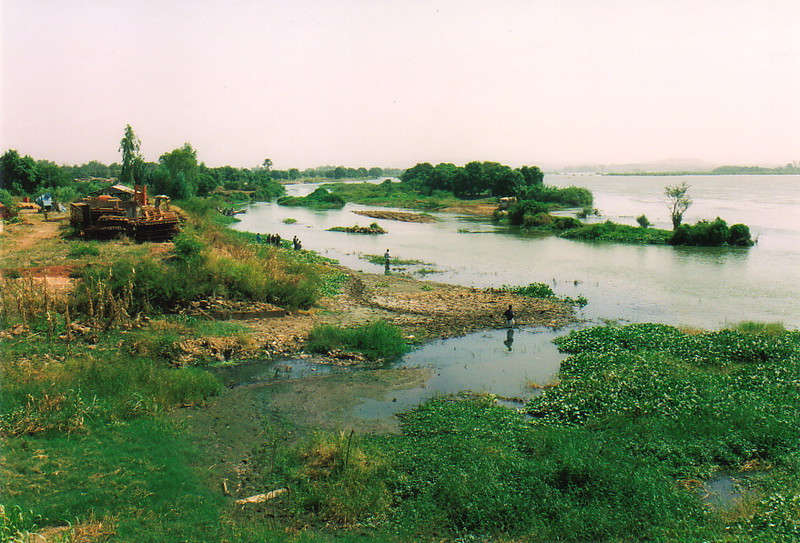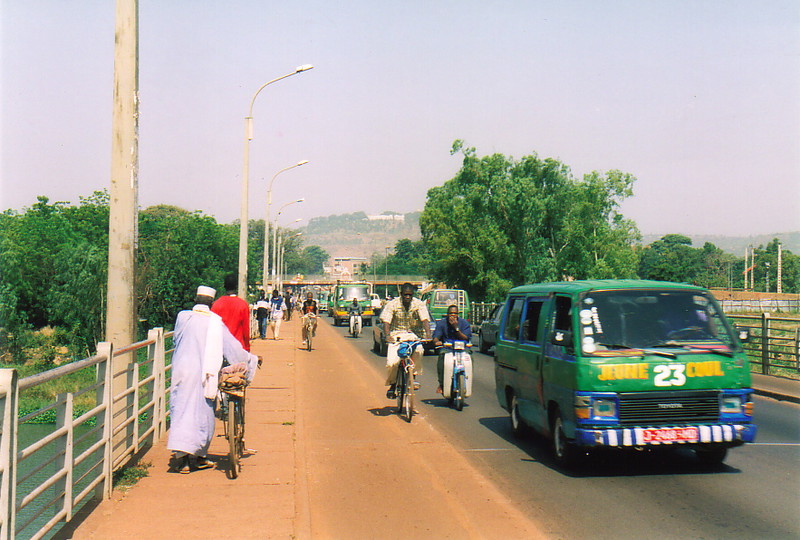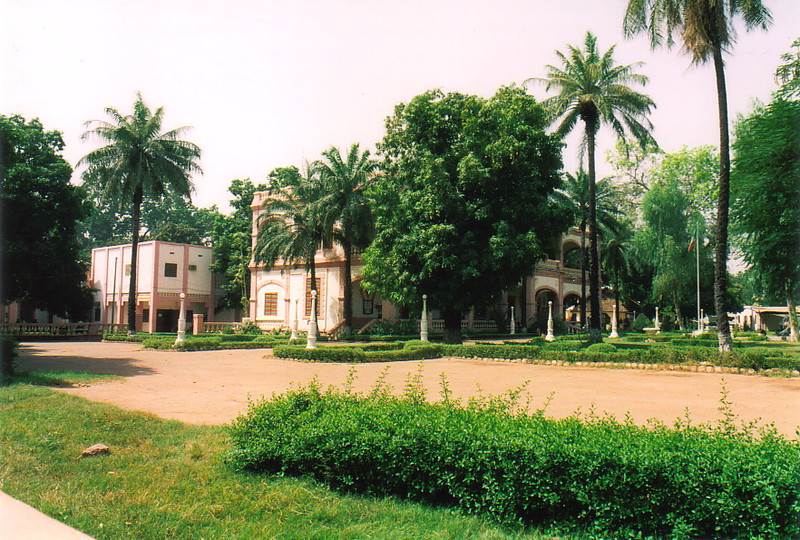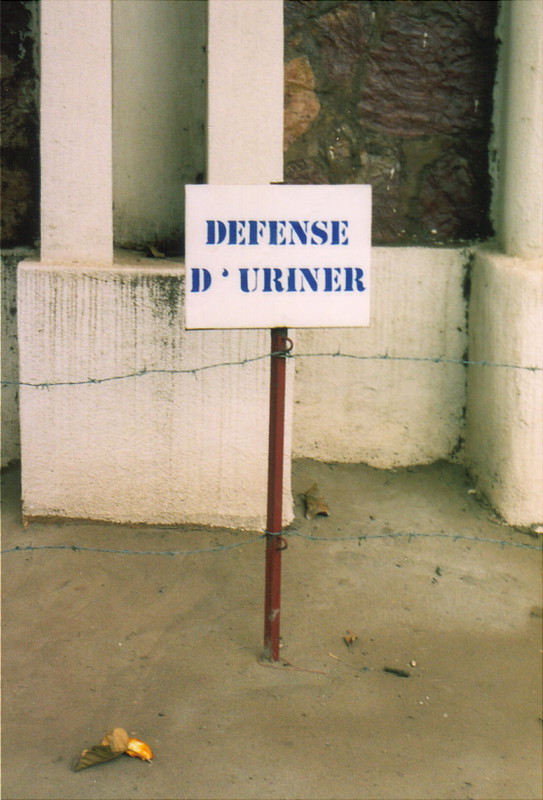
If selective hearing has a spiritual home, it must be Bamako. Never in my life have I known such a large proportion of people who are completely unable to grasp the words, 'No thank you, I do not want a guide for the Dogon Country, I don't want to buy any necklaces, and I don't want to hear any authentic African drumming.'
This is a pity, because being white and being in the capital of Mali seems to attract potential guides and jewellery sellers like a light does moths; they circle round and round and bash into you again and again, seemingly unaware of how utterly futile their actions are, but still the dance goes on.
To be fair, it's all pretty polite stuff, and if you're courteous but firm, most of them give up after a while and find someone else to pester... but I couldn't believe how quickly another tout would flit into view, punting exactly the same stuff; it was so incessant that it felt as if I was the target of a slickly orchestrated military operation. One evening I was sitting in a restaurant, waiting for my poulet yassa to arrive, and no fewer than five touts slid alongside me on the bench and regaled me with photos of the Dogon area, showed off their handicrafts, or tried to persuade me that the thing I wanted more than anything was to come with them to see some – wait for it – genuine African drumming at a special performance that very night.
The biggest problem with tout fever is that you have to make a concerted effort not to turn into a complete bastard. All your senses scream, 'Go on, tell this idiot to piss off, tell him you're sick of being constantly hassled, and tell him that he's putting you off ever hiring a guide, especially one as patently stupid as him – he can't even understand the word "no", for pity's sake.' But you have to hold yourself back, because they're only trying to make a buck; Mali is one of the poorest countries in the world, and who can blame the locals for trying to suck a bit of cash out of the fabulously wealthy tourists who slope into their country, with their Rolexes, smart clothes and credit cards?

So you keep your cool, you keep saying 'no' politely, and you keep on resisting the urge to snarl at everyone who introduces themselves to you in the street. The chances are high that most of the strangers who start chatting to you in the street are going to try selling you something, but not everyone is a tout, and you owe it to the silent majority to keep your cool. And when you meet a Malian who isn't trying to offload a necklace or tour, it's a wonderful thing, if only because it's so novel.
Touts aside, Bamako is a lovely little place. Sure, when I say 'lovely' I'm not using it in the rich European sense – like most cities on this planet, Bamako has piles of litter in the streets, open sewers with that authentic open sewer smell, and pollution that you can cut with a knife and which gives you a sore throat after an hour's stroll through the city centre – but once you get used to the city atmosphere, it's a friendly place.
It's also nicely compact, so walking round the centre is not only a possibility, it's a great idea. Some areas of Bamako are smothered in stalls – sometimes it feels like one big market – and some areas have wide boulevards and businesslike buildings, but there's normally something going on that's worth watching. The grand marché is a particularly mad old place, full of stalls, colour and touts, and the area round the River Niger is surprisingly green for such an urban setting. I loved it.
Shopping in Bamako

At times, though, it wasn't easy, especially when shopping. I hate shopping anyway, but I really wanted to buy a map of Mali so I could draw lots of pretty lines on it as therapy for spending hours cramped into Malian buses. You'd think this would be pretty easy in the country's capital, but you try telling that to the shopkeepers. Bookshops aren't exactly rife in West Africa – literacy rates are low, after all – and the few you find rarely sell maps, so I eventually found myself wandering into the grand marché, where I was pounced on by first one man, then his friend, and then another guy, all of whom wanted to know what I was looking for.
'A tourist map of Mali,' I said, and they went into overdrive, signalling for me to wait while they busied themselves asking around. I knew this was going to end up in a commission of some kind, but when I tried to go with them in their search, they weren't impressed. 'You should stay here and relax,' they said, and disappeared into the market. I figured I might as well give them a shot; I hadn't exactly had a lot of success on my own.
The first place they took me sold huge maps of Mali, carefully painted onto what looked like animal skin. They were nice, but nothing like the tourist map I was after; I explained that I wanted a fold-up paper map of Mali, for driving and tourism, and they signalled their understanding, tried to persuade me to look around the skin shop anyway, and when I insisted that I wasn't interested in buying anything made of animal skin, they marched me off into the market once more.

This time the stall owner proudly presented me with a glossy hardback book full of pictures of Mali, which happened to have a small map at the front. Yet again I explained that I was looking for a fold-up map of Mali, not a book, and yet again they wobbled their heads and whisked me off, deeper into the market. I was starting to wonder if maps of Mali even existed, but sure enough one of them soon came back, brandishing a map of sorts. It was a transport map of Mali, showing all the major routes in a style so outdated that I figured it would be worth buying, if only because it was so utterly pathetic. I showed a slight interest, and they smelled blood.
'What's the price?' I asked.
'For you, seventeen thousand five hundred CFA,' said the weediest of the three, who was obviously the main negotiator. I laughed; that meant the map cost about £17.50, a huge price, even when you consider that maps aren't as common in Mali as they are in car-dominated Europe.
'That's ridiculous,' I said.
'Then how much you pay?' he asked.
'Four thousand CFA,' I said. 'And it's barely worth that.'
'Four thousand?' he screamed. 'That is far too low a price!'
'Then make me a better offer,' I said.
'Fifteen thousand,' he said. 'It is a good map, look. It has Mopti, Timbuktu, Djenné, everything.'
'Five thousand,' I said.
'I cannot go lower than fourteen thousand,' he said, 'and then I make a loss.'
'Then we don't have a sale,' I said, and made to walk away. 'We're not even in the same ballpark here.'

'Then you make an offer,' he said. 'How much you pay?'
'Six thousand is all I would pay for this,' I said, relishing the bargaining. This was more like it; we were actually creeping towards a price somewhere between our opening bids. I could tell he really wanted to make a sale, unlike the miserable buggers I'd tried bargaining with in Senegal. 'Bring it on!' I thought.
'Twelve thousand is my final price,' he said.
'Seven,' I said.
'Eleven,' he said.
'Eight,' I said.
'Ten, and I cannot go lower than this,' he said.
'Nine thousand is my final offer,' I said. 'Otherwise I'm just not interested.'
'I cannot go lower than ten,' he repeated. 'If I sell for ten, then I only make one hundred CFAs for myself, and I need to eat.'
'And I need to buy some soap, and I can see a soap shop over there,' I said, making for the shop. 'I will buy it for nine thousand, final offer.'
'Ten thousand,' he said.

'OK, never mind, thanks for your time,' I said, and walked into the soap shop. One of the men, a guy called Ibrahim who hadn't been involved in the bargaining, followed me in. 'Uh oh,' I thought. 'What does he want?' But he helped me buy the right kind of soap and a toothbrush without getting in the way, and as I came out of the shop the negotiator sidled up to me and whispered, 'OK, nine thousand five hundred, my final offer, but don't tell anyone.'
I knew I had him on the ropes now; he was still tumbling but I'd stuck on my price and it was only a matter of time. 'Nine thousand, take it or leave it, your choice,' I said, ducking into another shop, this time for washing powder, a snip at CFA100 a sachet.
'OK, nine thousand, you take it for nine thousand,' he said as I blinked my way back into the sunlight, laden with Omo; and seconds later I had my map of Mali. No doubt CFA9000 for a map is still a stupid price, but it felt good to be bartering properly after the strangely reticent grumpiness of Senegal; if I did get ripped off, it was worth the price just for the fun of having a good old bargain.
Meanwhile Ibrahim helped me find a shampoo shop, didn't give me any grief when I said I was heading back to my hotel, and even refused my offer of a Coke as a thank-you for his help. This turned out to be because it was Ramadan, of course, and he couldn't drink anything until sunset, so I gave him the price of a Coke so he could buy one later, but the point still stands; he hadn't insisted on any remuneration. I was amazed; of all the places to find a genuinely helpful local, I'd found one in the grand marché. Allah moves in mysterious ways...
Bamako turned out not only to be a handy place for maps, soap, toothbrushes, washing powder and shampoo, it was a simple matter to pick up a visa to Burkina Faso (the next country on my list), a slightly more involved but still pretty painless affair to secure a bus ticket to Mopti, and a peaceful spot to catch some rest. If you can ignore the touts – and after a while, it becomes second nature – Bamako's a great place.
Though just imagine how much more fun I'd have had if I'd also had a bejewelled Dogon guide drumming for my pleasure. Never mind; perhaps you can have too much of a good thing...